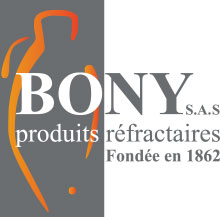Choice of refractory material grade depends on the type of kiln (vertical or rotary), the operating conditions and the stresses exerted on the area to be brick-worked.
A number of parameters must be considered when selecting refractory linings :

BONY offers a wide range of refractory materials meeting the constraints of calcination processes :
Choice of refractory material grade depends on the type of kiln (vertical or rotary), the operating conditions and the stresses exerted on the area to be brick-worked.
A number of parameters must be considered when selecting refractory linings :



In addition to its abrasion (chamotte and bauxite) and corrosion (andalusite – silicon carbide) resistant grades, BONY offers impregnation of refractory materials after baking so as to enhance their mechanical properties and corrosion resistance.
In the cement industry, rotary kiln operating parameters are not frozen and impact refractory lifetime.
Evolution in fuel types and, in particular, the increasing use of replacement fuels calls for greater attention as to choice and adaptation of refractory linings.
Consequently, basic refractory brickwork (magnesia, magnesia-spinel, magnesia-chromium, etc.) will necessarily evolve, and non-basic refractories (andalusites, silicon carbide, impregnation, etc.) may offer interesting answers, for example, for prevention of alkaline, sulphur and halogen attacks.
BONY’s R&D department has developed new grades satisfying the physico-chemical specifications required by its customers: reduction of thermal conductivity and porosity, reduction in Fe2O3 content, etc.





BONY is a French company manufacturing refractory bricks for industrial furnaces. We are at your disposal to discuss your needs and offer you high-performance and personalized products.
Website created by Le Moulin des Mots web agency
© 2021 Bony SAS, All rights reserved.